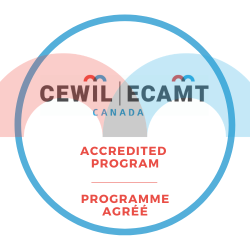Renewable Energies Technician (Co-op)

*Domestic applicants include Canadian citizens, permanent residents, protected persons and Convention refugees.
No doubt, renewable energy is no longer a trendy buzzword. In fact, it’s now at the heart of our power grid, lighting our homes and making sure the economy keeps moving forward. If you’re excited about the career potential available in this growing sector, and are looking to gain the skills necessary to begin, the Renewable Energies Technician program will open the door to limitless potential.
You’ll begin by building foundational knowledge in the electrical, electronic and mechanical disciplines and how they function in the Renewable Energies sector. As well, you’ll study the design and installation techniques required to work with various Renewable Energy solutions such as Solar Energy, Wind Turbines, Biomass Energy and Geothermal Energy Systems. You’ll also examine the best industry practices of health, safety and environmental conservation along with complete safety training for working at heights and confined spaces. Plus, you’ll be introduced to the general concepts associated with global climate change and the practicalities associated with sustainable energy including conservation techniques.
When you graduate, you’ll have an in-depth working knowledge of current practice in the installation, commissioning and routine maintenance and repair of Photovoltaic and Wind Turbine generating systems enabling them to function effectively in the utility scale Wind Turbine and Solar Photovoltaic industries.
Learn more about the programs and services of Fanshawe’s campus in St. Thomas.
The Renewable Energies Technician program offers a cooperative education component, which provides students the opportunity to gain invaluable first-hand workplace experience within their chosen field. Here are some co-op jobs that have kick-started the careers of some Renewable Energies Technician students before even graduating!
Metering/Engineering
Responsible for the installation, monitoring, and troubleshooting of Smart Meters.
Facility Maintenance Technicians
Assist with reducing facility downtime by performing duties such as programs, monitors, installs, and repairs to electrical, pneumatic, or mechanical components on a wide range of equipment.
Wind Turbine Service Technician
Responsible for the service and maintenance of wind turbines at a remote job site.
For more information regarding co-op, please check out our co-op site or contact the Co-op Office at coop@fanshawec.ca to connect with a consultant.
There is currently a shortage of qualified workers to support the renewable energies sector. Due to the rapid growth of this relatively new sector, there has been an equally impressive growth in the demand for certified technicians to install and service the associated equipment. By 2030, the renewable energies sector is projected to account for 20 per cent of electricity production and the creation of 6.3 million jobs across North America.
Graduates of Fanshawe’s Renewable Energies Technician program will be employed by owners of renewable energy projects such as wind and solar farms as well as third-party contractors to install and maintain equipment. Other opportunities may exist in sales and marketing, project site assessment, energy consulting and regulatory functions.
Did you know Fanshawe consistently ranks high in graduation employment rates among large colleges in Ontario?
Here are some examples of career opportunities for graduates of Fanshawe’s Renewable Energies Technician (Co-op) program:
Solar Technician
Conduct preventative maintenance and repair in order to maintain a utility scale solar power plant in good working order.
Wind Turbine Technician
Perform wind turbine maintenance and/or installation.
Field Technician
Perform turbine maintenance, component installation and replacement as necessary.
| Fall | Winter | Summer |
|---|---|---|
| Academic Level 1 | Academic Level 2 | Co-op |
| Academic Level 3 | Academic Level 4 | Co-op |
"I love the program. It's fast-paced with a lot to learn, but the professors make it fun and interesting. With a 100% graduate placement and the great faculty at Fanshawe, I'm very confident that I will find a rewarding and lucrative career in the renewable sector."

This program is accredited by Co-operative Education and Work Integrated Learning Canada. This accreditation represents the highest standard of achievement for co-operative education programs in Canada, and recognizes Fanshawe's commitment to excellence.
The graduate has reliably demonstrated the ability to:

Join Us for Open House
Find out if Fanshawe is the right fit for you at Open House. Explore Fanshawe's campuses, meet faculty and current students, and ask your questions about starting college.
Jeff Deconinck 433A, 442A
| Test | Score |
|---|---|
| TOEFL iBT | Overall score of 4.5 with no score less than 4 in any band |
| IELTS Academic | Overall score of 6.0 with no score less than 5.5 in any of the four bands |
| CAEL | Overall score of 60 with no score less than 50 in any of the four bands. score of 80 in listening |
| PTE Academic | Minimum score of 53 with no score less than 45 in any of the four bands |
| Cambridge English | Overall score of 169 with no language skill less than 162 |
| ESL4/GAP5 | Minimum grade of 80% in Level 8, 75% in Level 9, or 70% in Level 10 |
| Duolingo | Overall score of 105, with no score lower than 95 |
| LANGUAGECERT | Overall score of 65 with no score less than 60 in any of the four skills |
| Level 1 | ||||
| Gen Ed - Take a 3 credit General Education elective course. | ||||
| Take all of the following Mandatory Courses: | ||||
| ELEC-1145 | Electrical Theory | 6 | ||
| This course explores the principles of Electricity and Electronics as applied to Renewable Energy technologies. This course will present an in-depth introduction into the use of various tools and test equipment found in the Renewable Energy field including their proper use. Safe working practices are emphasized throughout. The course will provide the foundational knowledge related to wind energy and solar photovoltaic power generation. The course involves an in-depth coverage of AC and DC circuit theory including common sources of conventional power generation techniques contrasted with current methods of power generation using wind turbine and photovoltaic system technologies and their supporting systems. Additionally, there will be an introduction to semiconductor devices and basic digital electronics. The semiconductor devices are applied to analog circuitry including power supplies, transistor switching and amplifier circuits. | ||||
| ELEC-1137 | Applied Electrical Techniques | 2 | ||
| This course covers the proper use of test equipment as applied to A/C and D/C circuits with an emphasis on capacitive, inductive, magnetic, electromagnet, semiconductor and digital circuits. Emphasis is also placed on the basics of electrical measurement and interpretation as applied to power generation with acceptable procedures explained and practiced. Students will become proficient in the interpretation and construction of common electrical and electronic circuits. Practical lab exercises will develop hands-on troubleshooting skills. The student is also introduced to proper mechanical and electrical component interconnections, common wire types and their uses and the ability to solder them to a high standard of reliability. | ||||
| MATH-1213 | Mathematics for Electronics 1 | 2 | ||
| This course is the first of two courses that teach students the fundamental concepts of mathematics required to understand the theory of electricity and electronics. | ||||
| SFTY-1047 | Renewable Energy Safety | 3 | ||
| Upon successful completion of this course, the student will acquire skills utilizing the methods and procedures to safely work in the wind power and solar photovoltaic power generation industries. Students will gain awareness of the mechanical and electrical hazards commonly associated with a renewable energy installation. Students will receive training in the appropriate use of fall arrest equipment and arc flash and arc blast personal protective equipment; Lock-Out Tag-Out procedures; WHIMIS and SDS fundamentals; and insight to safe working procedures in confined spaces. Students will also learn appropriate communication with team members while moving and hoisting equipment through hand signals and basic radio communication. The causes and results of workplace accidents and injuries including common activities such as safe driving will be reviewed. | ||||
| SFTY-1069 | Safe Work Practices | 1 | ||
| This course introduces the student to the accepted techniques commonly used to eliminate and/or control hazards related to potential injury/illness in the renewable energy industry. Specifically, this course will begin the process of creating a "safety culture" that will prepare the student to work safely with electricity and outline the procedures for safe climbing methods and working at heights. Students will gain awareness of and practice various electrical safety protocols including protection from Arc Flash and Arc Blast, as well as, Lock Out/Tag Out procedures and Fire Safety and containment. Students will perform equipment maintenance on climbing and fall-arrest gear; cover the proper use of various PPE and other safety related gear when working on Renewable Energy generation systems and be provided with basic training in the use of lift equipment. Students will become proficient in the application of the Occupational Health & Safety Act & the associated regulations. | ||||
| DEVL-1054 | Skills for Career Success | 2 | ||
| This course will cover topics in digital literacy, career management and workplace communication. | ||||
[1] Total program costs are approximate and subject to change. They do not include additional fees such as the health and dental plan, bus pass, or general expenses. Learn more about ancillary and additional fees.